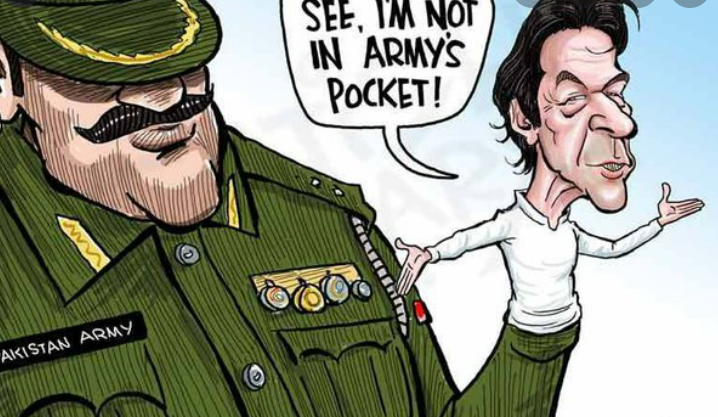Virendra Pandit
New Delhi: Ousted Prime Minister Imran Ahmed Khan Niazi has expressed apprehensions that Pakistan could be forced into denuclearization as a quid quo pro to take it off the hook on the foreign debt default issue, and, for the first time, also attacked the all-powerful military which propped his government for nearly four years.
“Pakistan is going towards a default. If that happens, then which institution will be (the worst) hit? The Army. After they hit it, what concession they will take from us? Denuclearization,” he remarked in a media interview on Wednesday.
If Pakistan were to lose its nuclear deterrent capability, it would fragment it into three pieces. “If the right decisions aren’t made then the country is going towards suicide,” he warned.
No Pakistani PM has, so far, dared call even the Army “the Army”. They all merely identified it as “the Establishment”, to avoid complications with an organization they hobnobbed with and worked under for so long.
On Wednesday, however, Imran Khan, 69, broke this tradition. In an interview with Pakistan’s BOL News, he unusually attacked the military and admitted his government was “weak”. It was “blackmailed from everywhere” as it did not have real power. “Everyone knows where it was and is.”
Even before he was ousted from power on April 10, after losing a no-confidence vote in Parliament, he had been accusing the US of conspiring against his leadership because of his independent foreign policy decisions on Russia, China, and Afghanistan. He also dubbed his successor Shehbaz Sharif’s coalition government as an “imported” one. In several rallies since, he attacked both the US and the new government, demanding early elections.
For the first time, however, the Pakistan Tahreek-e-Insaf (PTI) chief changed the track by directly attacking the Army, according to the media reports.
Asked to recall the events of the night of the no-confidence vote against him, who was issuing orders and who had impeded the cases against the Pakistan Peoples Party (PPP) and Pakistan Muslim League-Nawaz (PML-N) leaders, he said his government was “weak” when it came to power and had to seek coalition partners. If the same situation were to arise again, he would opt for re-elections and seek a majority government or none at all.
“Our hands were tied. We were blackmailed from everywhere. Power wasn’t with us. Everyone knows where the power lies in Pakistan, so we had to rely on them,” the cricketer-turned-politician said, elaborating no further who he was referring to.
Imran Khan, who came to power in 2018 with the backing of the Pakistan Army, is the only Prime Minister ousted in a no-confidence vote in Parliament.
He said Pakistan must have a “strong army” because of the threat posed by the enemies, but said there was also the need to strike a “balance” between having a strong army and a strong government.
“We relied on them all the time. They did a lot of good things too, but they didn’t do many things that should’ve been done. They have the power because they control institutions such as NAB (National Accountability Bureau), which wasn’t in our control,” he said.
Khan said while his government had the responsibility, it did not have all the power and the authority.
The Pakistan Army, which has ruled the coup-prone country for over half of its 73 years of existence, has hitherto wielded considerable power in the matters of security and foreign policy. Publicly, however, it has continuously denied its involvement in politics.
Imran Khan had lost the Army’s support after he refused to endorse the appointment of Lt. Gen. Naeem Anjum as the ISI spy agency chief last year. Finally, he surrendered to the Army, but it soured his ties with it.
“No management works if I have responsibility but have no complete power and authority. A system works only when responsibility and authority are in one place.” The current political situation was a problem for the country and the “Establishment.”
“If the Establishment doesn’t make the right decisions, then I can assure in writing that (before everyone else) they and the Army will be destroyed because of what will become of the country if it goes bankrupt,” he said.
Prodded further to share his thoughts on the night of the no-confidence vote, Imran declined to go into details and said: “History forgives no one. Things come out. If you ask me, I won’t go into details, but when history will be written then it’ll be counted a night in which they damaged Pakistan and its institutions a lot.”
“Those same institutions weakened Pakistan, which gave it its foundation and strengthened it,” he said.
Imran Khan said he had “clearly told the neutrals” that his government’s economic performance, despite the Covid-19 pandemic, was a “miracle”.
“I told them if you do this and if this conspiracy (to remove my government) is successful, then our economy will go down,” he said.
Imran Khan said the country stood on the cusp of a “defining moment”, calling it a “trial for the Establishment”.
“Everyone knows they’re the powerbrokers, so they’re on trial. This is a trial of the judiciary and the Supreme Court (as well).”

